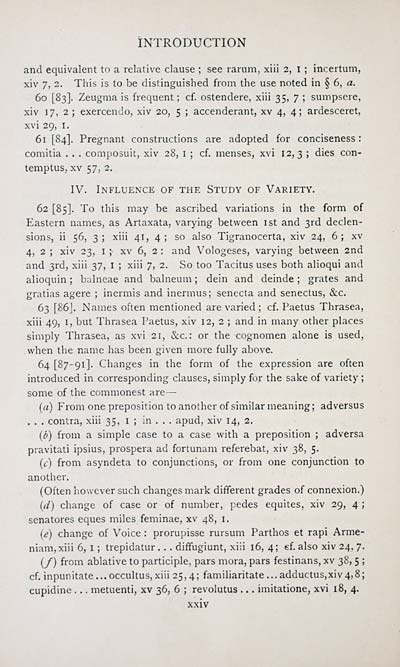Download files
Complete book:
Individual page:
Thumbnail gallery: Grid view | List view

INTRODUCTION
and equivalent to a relative clause ; see rarum, xiii 2, I ; incertum,
xiv 7, 2. This is to be distinguished from the use noted in § 6, a.
60 [82]- Zeugma is frequent ; cf. ostendere, xiii 35, 7 ; sumpsere,
xiv 17, 2 ; exercendo, xiv 20, 5 ; accenderant, xv 4, 4; ardesceret,
xvi 29, I.
61 [84]. Pregnant constructions are adopted for conciseness :
comitia . . . composuit, xiv 28, i ; cf. menses, xvi 12, 3 ; dies con-
temptus, XV 57, 2.
IV. Influence of the Study of Variety.
62 [85]. To this may be ascribed variations in the form of
Eastern names, as Artaxata, varying between ist and 3rd declen-
sions, ii 56, 3; xiii 41, 4; so also Tigranocerta, xiv 24, 6; xv
4, 2 ; xiv 23, I ; xv 6, 2 : and Vologeses, varying between 2nd
and 3rd, xiii 37, I ; xiii 7, 2. So too Tacitus uses both alioqui and
alioquin ; balneae and balneum ; dein and deinde ; grates and
gratias agere ; inermis and inermus; senecta and senectus, &c.
63 [86J. Names often mentioned are varied ; cf. Paetus Thrasea,
xiii 49, I, but Thrasea Paetus, xiv 12, 2 ; and in many other places
simply Thrasea, as xvi 21, &c. : or the cognomen alone is used,
when the name has been given more fully above.
64 [87-91]. Changes in the form of the expression are often
introduced in corresponding clauses, simply for the sake of variety ;
some of the commonest are —
(a) From one preposition to another of similar meaning; adversus
. . . contra, xiii 35, I ; in . . . apud, xiv 14, 2.
(d) from a simple case to a case with a preposition ; adversa
pravitati ipsius, prospera ad fortunam referebat, xiv 38, 5.
(t) from asyndeta to conjunctions, or from one conjunction to
another.
(Often however such changes mark different grades of connexion.)
{d) change of case or of number, pedes equites, xiv 29, 4 ;
senatores eques miles feminae, xv 48, i.
(e) change of Voice : prorupisse rursum Parthos et rapi Arme-
nian!, xiii 6, I ; trepidatur . . . diffugiunt, xiii 16, 4 ; ef. also xiv 24, 7.
(/) from ablative to participle, pars mora, pars festinans, xv 38, 5 ;
cf. inpunitate ... occultus, xiii 25, 4 ; familiaritate . . . adductus.xiv 4, 8 ;
cupidine . . . metuenti, xv 36, 6 ; revolutus . . . imitatione, xvi 18, 4.
xxiv
and equivalent to a relative clause ; see rarum, xiii 2, I ; incertum,
xiv 7, 2. This is to be distinguished from the use noted in § 6, a.
60 [82]- Zeugma is frequent ; cf. ostendere, xiii 35, 7 ; sumpsere,
xiv 17, 2 ; exercendo, xiv 20, 5 ; accenderant, xv 4, 4; ardesceret,
xvi 29, I.
61 [84]. Pregnant constructions are adopted for conciseness :
comitia . . . composuit, xiv 28, i ; cf. menses, xvi 12, 3 ; dies con-
temptus, XV 57, 2.
IV. Influence of the Study of Variety.
62 [85]. To this may be ascribed variations in the form of
Eastern names, as Artaxata, varying between ist and 3rd declen-
sions, ii 56, 3; xiii 41, 4; so also Tigranocerta, xiv 24, 6; xv
4, 2 ; xiv 23, I ; xv 6, 2 : and Vologeses, varying between 2nd
and 3rd, xiii 37, I ; xiii 7, 2. So too Tacitus uses both alioqui and
alioquin ; balneae and balneum ; dein and deinde ; grates and
gratias agere ; inermis and inermus; senecta and senectus, &c.
63 [86J. Names often mentioned are varied ; cf. Paetus Thrasea,
xiii 49, I, but Thrasea Paetus, xiv 12, 2 ; and in many other places
simply Thrasea, as xvi 21, &c. : or the cognomen alone is used,
when the name has been given more fully above.
64 [87-91]. Changes in the form of the expression are often
introduced in corresponding clauses, simply for the sake of variety ;
some of the commonest are —
(a) From one preposition to another of similar meaning; adversus
. . . contra, xiii 35, I ; in . . . apud, xiv 14, 2.
(d) from a simple case to a case with a preposition ; adversa
pravitati ipsius, prospera ad fortunam referebat, xiv 38, 5.
(t) from asyndeta to conjunctions, or from one conjunction to
another.
(Often however such changes mark different grades of connexion.)
{d) change of case or of number, pedes equites, xiv 29, 4 ;
senatores eques miles feminae, xv 48, i.
(e) change of Voice : prorupisse rursum Parthos et rapi Arme-
nian!, xiii 6, I ; trepidatur . . . diffugiunt, xiii 16, 4 ; ef. also xiv 24, 7.
(/) from ablative to participle, pars mora, pars festinans, xv 38, 5 ;
cf. inpunitate ... occultus, xiii 25, 4 ; familiaritate . . . adductus.xiv 4, 8 ;
cupidine . . . metuenti, xv 36, 6 ; revolutus . . . imitatione, xvi 18, 4.
xxiv
Set display mode to: Large image | Transcription
Images and transcriptions on this page, including medium image downloads, may be used under the Creative Commons Attribution 4.0 International Licence unless otherwise stated. ![]()
| Early Gaelic Book Collections > Matheson Collection > Cornelli Taciti annalium > (28) |
|---|
| Permanent URL | https://digital.nls.uk/76567263 |
|---|
| Description | Items from a collection of 170 volumes relating to Gaelic matters. Mainly philological works in the Celtic and some non-Celtic languages. Some books extensively annotated by Angus Matheson, the first Professor of Celtic at Glasgow University. |
|---|
| Description | Selected items from five 'Special and Named Printed Collections'. Includes books in Gaelic and other Celtic languages, works about the Gaels, their languages, literature, culture and history. |
|---|

